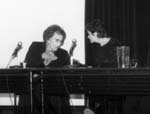Maxine Greene: Exclusions and Awakenings
When Maxine Greene walks into the room, people get excited.
The premiere of the film, "Exclusions and Awakenings: The Life of Maxine Greene," directed by Markie Hancock and produced by Kathryn Gregorio, was no exception. When Greene, TC Professor Emerita of Philosophy and Education, walked into the packed auditorium at The New School, she was met with a standing ovation and loud cheering.
The film opened simply with a close-up of Greene in a chair in a solid gray room. She said candidly that what the audience is about to view is all lies. Greene quickly explained that the film is her history as she sees it, filtered through her perception, perhaps not how it really took place.
"It's all a lie when you give narrative form a life," said Greene. "It's a creative reality, not a lived reality."
Her many accomplishments have earned her a following from both inside and outside of Teachers College. One New York City public school teacher stood up and said, "We all need shots of Maxine's inspiration every once in a while."
Greene was the editor of the Teachers College Record, past president of the Philosophy of Education Society, the American Educational Studies Association, and the American Educational Research Association. She has written more than one hundred chapters in various educational collections in the domains of art, curriculum, literature and social philosophy. She is the author of six books: Teacher as Stranger, The Public School and the Private Vision, Existential Encounters for Teachers, Landscapes of Learning, The Dialectic of Freedom, and Releasing the Imagination. Also, this spring a collection of Greene's lectures called Variations on the Blue Guitar will be published.
Weaving through the past and present, "Exclusions and Awakenings" captures the hurdles and triumphs that Greene faced as philosopher, mother, professor, wife, and leader-from her childhood in Brooklyn to the balancing act of school, motherhood and marriage.
"The film has been a personal project for me," said Hancock, a former New York City public school teacher. "It grew out of my passion for education and the inspiration that Maxine Greene has had in my life."
Hancock, who first encountered Greene's name in a textbook while in graduate school, found that Greene's writing was different than everything else she was reading that year. A few years later when she became acquainted with Greene while she was teaching, she realized that it wasn't just Greene's writing that is powerful, her presence is too.
In 1996, she asked permission to start research on the documentary beginning with audio recordings of interviews with Greene. In making the film, Hancock and Associate Producer Ansley Erickson, had to consider what other voices to include in telling Greene's story.
Hancock chose Wendy Kohli, Director of Teacher Education at The New School, and Rosalind Rosenberg, Professor of History at Barnard College. "I was adamant about wanting only women's voices to tell this story, in part a response to all the male voice-overs that tell so many stories and because this is a story about the silencing and emergence of the female voice," she said.
Hancock chose documentary film to tell Greene's story because it is part art form and part educative medium that lends itself well to interpreting both Greene's life and work. "I wanted the film to be poetic and free associative as well as rigorous, just as Maxine is all of these things," she said.
After the film ended, a panel discussion included Janice Robinson-Hill, Director of Education at the Joyce Theatre, Greene, Hancock, Kohli and Rosenberg. The audience members posed questions and thanked the panelists.
"Thank you for making this film," said one of the education students in the audience after the film. "Actors, writers, and other artists have many inspirational films, but this is the first one I have seen for teachers."
To purchase "Exclusions and Awakenings," contact:
University of California Extension Center for Media & Independent Learning
2000 Center Street, 4th Floor
Berkeley, CA 94704.
You can reach them at 510.642.0460 or cmil@uclink.berkeley.edu.
Published Tuesday, Sep. 18, 2001
